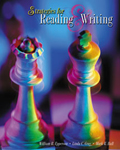Strategies for Reading and Writing
Author(s): William Epperson , Mark Hall , Linda Gray
Edition: 1
Copyright: 1999
Pages: 420
Strategies for Reading and Writing, ed. William R. Epperson, Linda C. Gray, and Mark R. Hall, anthologizes essays, stories, and poems for students writing academic essays in the liberal arts. The book focuses on basic skills such as active reading, summarizing, and paraphrasing and suggests writing assignments that provide practice in the classic modes of development (e.g., description, comparison/contrast, and cause/effect) Exemplary essays of these modes are provided by such writers as Henry David Thoreau, C. S. Lewis, Dorothy L. Sayers, Jonathan Swift, E. M. Forster, George Orwell, Martin Luther King, Jr., and Malcolm X. Selected stories provide material for analysis, discussion, and student reflection though such fiction writers as Stephen Crane, Nathaniel Hawthorne, Guy de Maupassant, Flannery O’Connor, Mark Twain, and John Updike. Poets from John Donne, George Herbert, and Gerard Manley Hopkins to T. S. Eliot, Robert Frost, and Theodore Roethke, reveal how poetry contributes in its distinct way to the subjects and themes presented in the essays and short stories. The book serves as a balanced, concise anthology, a source of ideas and insights from some of our finest writers, stimulating discussion, evaluation, and thoughtful essays, particularly for freshman composition students at Christian colleges. Accompanied by a composition handbook, it provides material for a well-designed course.
Strategies for Reading and Writing, ed. William R. Epperson, Linda C. Gray, and Mark R. Hall, anthologizes essays, stories, and poems for students writing academic essays in the liberal arts. The book focuses on basic skills such as active reading, summarizing, and paraphrasing and suggests writing assignments that provide practice in the classic modes of development (e.g., description, comparison/contrast, and cause/effect) Exemplary essays of these modes are provided by such writers as Henry David Thoreau, C. S. Lewis, Dorothy L. Sayers, Jonathan Swift, E. M. Forster, George Orwell, Martin Luther King, Jr., and Malcolm X. Selected stories provide material for analysis, discussion, and student reflection though such fiction writers as Stephen Crane, Nathaniel Hawthorne, Guy de Maupassant, Flannery O’Connor, Mark Twain, and John Updike. Poets from John Donne, George Herbert, and Gerard Manley Hopkins to T. S. Eliot, Robert Frost, and Theodore Roethke, reveal how poetry contributes in its distinct way to the subjects and themes presented in the essays and short stories. The book serves as a balanced, concise anthology, a source of ideas and insights from some of our finest writers, stimulating discussion, evaluation, and thoughtful essays, particularly for freshman composition students at Christian colleges. Accompanied by a composition handbook, it provides material for a well-designed course.
